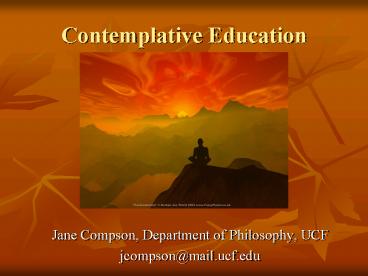Contemplative Education - PowerPoint PPT Presentation
1 / 16
Title:
Contemplative Education
Description:
Contemplation - 'a third way of knowing that complements the rational and the sensory. ... BALD heads forgetful of their sins, Old, learned, respectable bald heads ... – PowerPoint PPT presentation
Number of Views:135
Avg rating:3.0/5.0
Title: Contemplative Education
1
Contemplative Education
- Jane Compson, Department of Philosophy, UCF
- jcompson_at_mail.ucf.edu
2
Overview
- Terms contemplation and mindfulness
- The problem
- Contemplative education as a response
- Practice!
3
Contemplation
- Contemplation - a third way of knowing that
complements the rational and the sensory.
Contemplative practices quiet and shift the
habitual pattern of the mind to cultivate a
capacity for deepened awareness, concentration
and insight. (Tobin Hart, 2004)
4
Contemplation as a missing link
5
Mindfulness
- Mindfulness is a flexible state of mind in which
we are actively engaged in the present, noticing
new things and sensitive to context. (Langer,
1998) - Mindfulness means paying attention in a
particular way On purpose,in the present
moment, andnonjudgmentally. John Kabat-Zinn,
2006
6
- Every way of knowing, every epistemology,
becomes an ethic. (Parker J Palmer) - The modern emphasis on objectification
predisposes us to an instrumental and
manipulative way of being in the world. (Arthur
Zajonc) - (Hard Times)
7
W.B. Yeats The Scholars
- BALD heads forgetful of their sins, Old,
learned, respectable bald heads Edit and
annotate the lines That young men, tossing on
their beds, Rhymed out in love's despair To
flatter beauty's ignorant ear. All shuffle
there all cough in ink All wear the carpet
with their shoes All think what other people
think All know the man their neighbour knows.
Lord, what would they say Did their Catullus
walk that way?
8
Divide and Conquer
- I am come in very truth leading to you nature
with all her children to bind her to your service
and make her your slave (Francis Bacon, The
Masculine Birth of Time) - The scheme of Nature, regarded in its whole
extent, cannot have had, for its sole or even
principal object, the good of human or other
sentient beings. What good it brings to them is
mostly the result of their own exertions.
Whatsoever, in nature, gives indication of
beneficent design proves this beneficence to be
armed only with limited power and the duty of
man is to cooperate with the beneficent powers,
not by imitating, but by perpetually striving to
amend, the course of nature - and bringing that
part of it over which we can exercise control
more nearly into conformity with a high standard
of justice and goodness. John Stuart Mill, On
Nature
9
Loving wisdom
- Knowing itself remains partial and deformed if
we do not develop an epistemology of love instead
of an epistemology of separation. (Zajonc)
10
- In a world beset with conflicts, internal as
well as external, isnt it of equal if not
greater importance to balance the sharpening of
our intellect with the systematic cultivation of
our hearts? Do not the issues of social justice,
the environment and peace education all demand
greater attention and a more central place in our
universities and colleges? (Zajonc 2006)
11
Zajoncs epistemology of love
- Contemplative inquiry not only yields insight
(veritas) but also transforms the knower through
his or her intimate (one could say loving)
participation in the subject of ones
contemplative attention. (p.2)
12
Contemplative Education (Zajonc)
13
Time to practice
14
The religious issue
- Opening the contemplative mind in schools is not
a religious issue but a practical epistemic
question. It is about how we know, not about
what knowledge we are giving others. Inviting the
contemplative simply includes the natural human
capacity for knowing through silence, looking
inward, pondering deeply, beholding, witnessing
the contents of our consciousness and so forth.
These approaches cultivate an inner technology of
knowing and thereby a technology of learning and
pedagogy without any imposition of religious
doctrine whatsoever. If we knew that particular
and readily available activities would increase
concentration, learning, wellbeing, and social
and emotional growth and catalyze transformative
learning, we would be cheating our students to
exclude it. - (Tobin Hart, Opening the Contemplative Mind in
the Classroom, Journal of Transformative
Education Vol 2. No. 1 January 2004, p.29)
15
Mindful Learning (Ellen Langer)
16
Resources
- Brown, J., Langer, E. (1990). Mindfulness and
intelligence A comparison. Educational
Psychologist, 25(3), 305-335. - Carson, S., Shih, M., Langer, E. (2001). Sit
still and pay attention? Journal of Adult
Development, 8(3), 183-188. - Claxton, G. (2005). Mindfulness, learning and the
brain. Journal of Rational-Emotive Cognitive
Behavior Therapy, 23(4), 301-314. - Hart, T. (2004). Opening the contemplative mind
in the classroom. Journal of Transformative
Education, 2(1), 28-46. - Kabat Zinn, J. (2005). Coming to our senses
Healing ourselves and the world through
mindfulness (1st ed.). New York Hyperion. - Kabat Zinn, J., University of Massachusetts
Medical Center/Worcester Stress Reduction Clinic.
(2005). Full catastrophe living Using the
wisdom of your body and mind to face stress,
pain, and illness (Delta trade pbk. reissue ed.).
New York, N.Y. Delta Trade Paperbacks - Langer, E. J. (1993). A mindful education.
Educational Psychologist, 28(1), 43-50. - Langer, E. J. (1997). The power of mindful
learning Addison-Wesley/Addison Wesley Longman. - Langer, E. J. (2000). Mindful learning. Current
Directions in Psychological Science, 9(6),
220-223. - Palmer, P J (1998), The Courage to Teach.
- ZAJONC, A. (2006). Love and knowledge Recovering
the heart of learning through contemplation.
Teachers College Record, 108(9), 1742-1759. - www.contemplativemind.org
- http//www.arthurzajonc.org/uploads/JCAL20Love20
and20Knowledge20paper.pdf - http//www.mindfuled.org/
- www.arthurzajonc.org































